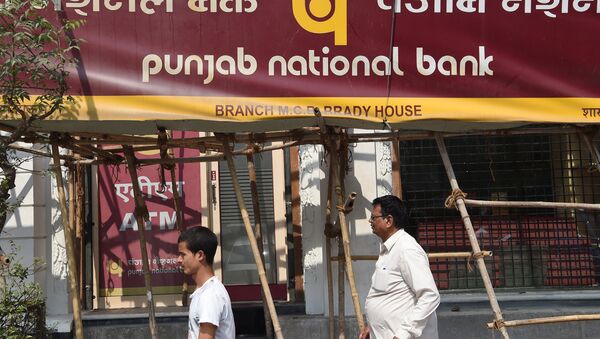New Delhi (Sputnik) — While the Punjab National Bank says it is still investigating what caused the fraud to go undetected for seven years, economist Vijay Sardana says the answer is simple: too much power in the hands of few.
"If the government (in India) is keen to clean the system from corruption and frauds, they must ruthlessly enforce laws and fix accountability and remove all discretionary powers from individuals and shift it to the committees to make the system accountable and transparent," said Vijay Sardana.
READ MORE: Diamond Merchant Allegedly Defrauds India's Second Largest Bank Out of $1.8 Bln
Sputnik: What is the scam all about?
Vijay Sardana: It is one of the biggest scams in the country's corporate history. Delhi-based Punjab National Bank (PNB), the country's second-largest public-sector bank (PSB), said last week that it has been defrauded of about Rs 114 billion ($1.8 billion) by a jeweler named Nirav Modi, his maternal uncle Mehul Chinubhai Choksi, and other relatives through a cluster of companies they own. The bank said two of its employees were involved in the scam, where the bank's core banking system was bypassed to raise payment notes to overseas branches of other Indian banks using the international financial communication system, SWIFT.
Sputnik: Why did this scam remain undetected in audits?
Vijay Sardana: The fraud in PNB is a case of operational risk arising because of rogue behavior by one or more employees of the bank and failure of internal controls. This is due to the poor management system in the banks. Incompetent auditors both internal and external and careless board of directors in all the banks associated with the fraud ensured that the fraud not only remained undetected, but flourished with time. The central bank failed in ensuring auditing of the risk management system and enforcing a sensible auditing system in the banking system, including foreign exchange tracking. People involved undertook unauthorized trades and there was a failure of SOP and failure of corporate governance to track it.
Sputnik: After the Vijay Mallya case, now Nirav Modi — do such incidences break the confidence of international investors?
Vijay Sardana: Yes, it does break the confidence. It indicates that the system is managed by people who are either incompetent or corrupt. It also suggests that the auditing system is ineffective, sending a very wrong message about the governance in the country.
Sputnik: What are the remedies?
Vijay Sardana: Remedies are simple. The government of India must issue clear directives to all authorities to enforce global best practices and risk management in financial transactions across the spectrum of industries. These must be enforced ruthlessly in a time-bound manner. All auditing and rating agencies must be made accountable for frauds if they remain undetected beyond the auditing frequencies and rating frequencies. The board of directors and all heads of the departments must submit an undertaking to concerned authorities that they have evaluated the effective risk management. They must do dummy trials test the effectiveness of the systems.
Sputnik: What is the setback like? How much time will the banking sector take to recover?
Vijay Sardana: It is difficult to say now. The losses may increase due to various factors. After demonetization, there was a disruption in the normal business cycle which led to the creation of many NPAs. Before demonetization, many corporate entities took excessive loans based on inflated market projections based on poor research shared by many well-known consulting companies. This resulted in capacity-creation but poor business-realization. Banks also extended credit based on these ill-researched project reports. All these led to the serious banking crisis. This type of fraud also shakes confidence in the private sector.
READ MORE: Major Setback for India's Adani Group in Controversial Australian Coal Block
Sputnik: Why have the Indian government's initiatives on curbing black money not yielded the expected results? Where are the fault lines?
Vijay Sardana: In my view, there was a gap between what they (Indian government) were saying and what they were doing. For example — the common citizen was told to adopt digital payment for day-to-day petty transactions, but the same was not enforced for political donations.
The political donation was kept open for cash transfers. Corporates were asked to contribute for the political donation. Most of the unaccounted and black money goes into funding political activities. There are clear examples that the fight against black money and corruption is half-hearted. The common man still suffers due to poor delivery by an inefficient system. India's ranking in the corruption index is linked to black money.
READ MORE: China Development Bank Drags Indian Telco to Bankruptcy Court
Sputnik: What is your advice to international investors?
Vijay Sardana: India has hugely attractive opportunities. One must invest to take the benefit of this market. My suggestion is to invest and just stick to good management practices and risk management.
The views and opinions expressed by Vijay Sardana in this article are those of the speaker and do not necessarily reflect the position of Sputnik.

